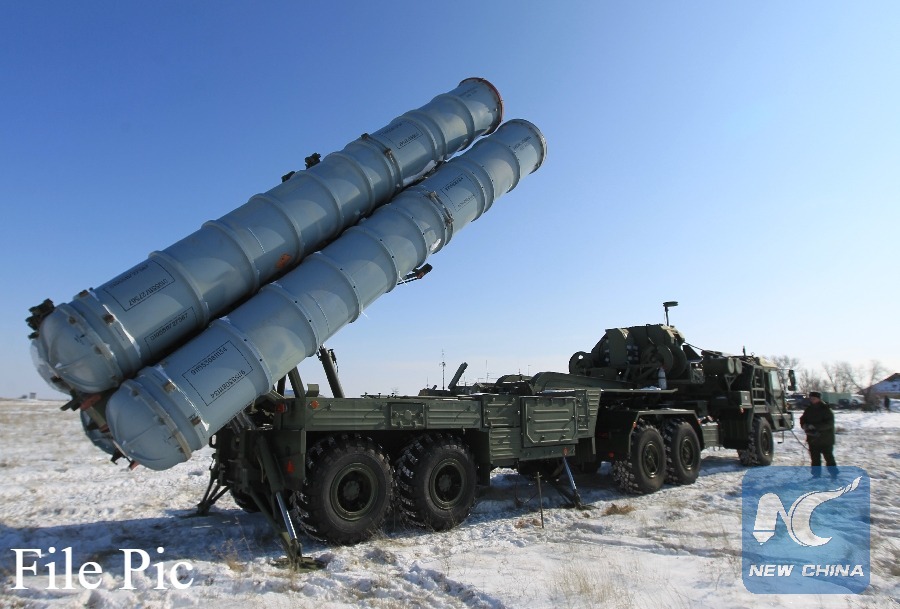
S-400 air defense missile systems are being put through final tests before delivery at Kapustin Jarl range in Astrakhan State, Russia, on Feb. 17, 2011. (RIA Novosti File photo)
ISTANBUL, April 8 (Xinhua) -- U.S. Vice President Mike Pence's suggestion that Turkey would need to leave NATO if it buys Russian S-400 air defense system is no more than a bluff, but Washington would economically pressure Ankara to drop the deal, analysts told Xinhua.
"Pence's remark is just a big bluff," said Hasan Koni, an analyst on international relations with Istanbul Culture University. He drew attention to NATO chief Jens Stoltenberg's divergent view on the issue.
Washington, extremely vexed by Ankara's decision to acquire the sophisticated Russian system, fears the S-400 missiles may compromise NATO's security. The U.S. appears to be particularly concerned the system may spy on the U.S.-made stealth F-35 jets to be based in Turkey.
"Turkey must choose," Pence said on Wednesday. "Does it want to remain a critical partner in the most successful military alliance in history or does it want to risk the security of that partnership by making such reckless decisions that undermine our NATO alliance?"
Amid rising tension over the dispute, Washington suspended earlier this week the delivery to Ankara of the equipment related to F-35 fighter jets Ankara is expected to get later this year.
As opposed to Pence, NATO's Stoltenberg said a day later that it was up to each NATO member country to decide what weapons to buy.
Koni feels that the United States cannot afford to lose Turkey, a major regional power, at a time when it seeks to contain Russia in the Black Sea, the eastern Mediterranean and the Caucasus.
Kicking Turkey out of NATO is an overreaction and would hit the U.S. as well, said Ilhan Uzgel, an international relations analyst.
As a result, Washington would no longer be able to use the military and intelligence facilities in Turkey and it would mean a loss of prestige for NATO, he argued.
"Besides, Turkey would then get closer to Russia and Iran and in fact, to China," he added.
Ankara is scheduled to get the first batch of the S-400 air defense system in July.
Turkey does not have to make a choice, Turkish Foreign Minister Mevlut Cavusoglu said, arguing the S-400 system would not pose a threat to F-35s or any NATO system in Turkey.
The U.S. would exert economic pressure to dissuade Turkey, but the two sides would reach a compromise in the end, Koni said, as Cavusoglu once again said in Washington that Turkey was ready to buy U.S. Patriot missiles as well.
"The U.S. should be expected to use economic tools to dissuade Ankara from buying the S-400s," Uzgel said, noting the economy is Turkey's soft spot.
Turkey is in need of huge foreign capital to run its debt-stricken economy amid high inflation and unemployment and signs of recession.
Russia would not like the idea of Ankara being pushed out of NATO either, Koni said, arguing Turkey under the rule of an Islamist administration would then adopt an Islamist line in foreign policy, making itself more appealing to the Muslim population in Russia.
A Turkey in NATO would remain committed to the secular West, opined Koni.
While in Washington D.C. for a NATO meeting last week, Cavusoglu took up the S-400 issue with his U.S. counterpart Mike Pompeo, saying he believed that Ankara and Washington could agree on the price of the Patriots, but the U.S. administration cannot guarantee a Congressional approval for such a deal with Turkey.
For his part, Pompeo expressed hope that the two countries would manage to "find a path forward," saying there were great opportunities for closer cooperation.
However, Turkish President Recep Tayyip Erdogan once again underlined on Friday Ankara's resolve to go ahead with the S-400 deal, saying it was done and the payments were continuing.
In contrast to Cavusoglu's remarks in Washington, the president added that as things stood, the U.S. proposal regarding the Patriots was not attractive to Turkey.
Erdogan is scheduled to meet with his Russian counterpart Vladimir Putin in Moscow on Monday, with the S-400 issue atop the agenda.
Despite Ankara's attitude, both analysts feel that Turkey may keep the S-400s inactive on its soil while also getting the Patriots from the U.S., arguing Washington could settle for such a compromise.
Turkey may also be using the S-400 deal to get the Patriots at a lower price, maintained Uzgel.
Ankara has repeatedly said the S-400 system would not be integrated into the NATO system to appease Washington's fear.
Acquisition of the S-400 system entails a strategic partnership with Russia, something highly disturbing for the United States, commented Uzgel.
Ankara would not wish to break up with Washington either as it risks confrontation with Moscow over Syria's Idlib, remarked Koni.
Upon Turkey's insistence, Moscow agreed in September last year to put off dealing with jihadist rebel groups in Idlib, the last major stronghold for rebels in war-torn Syria.
However, Hayat Tahrir al-Sham, an al-Qaida-linked jihadist group, gained control of a huge portion of the province following clashes earlier this year with Turkey-backed rebel groups, and it is widely argued that Moscow may not wish to tolerate the rebel threat much longer.

